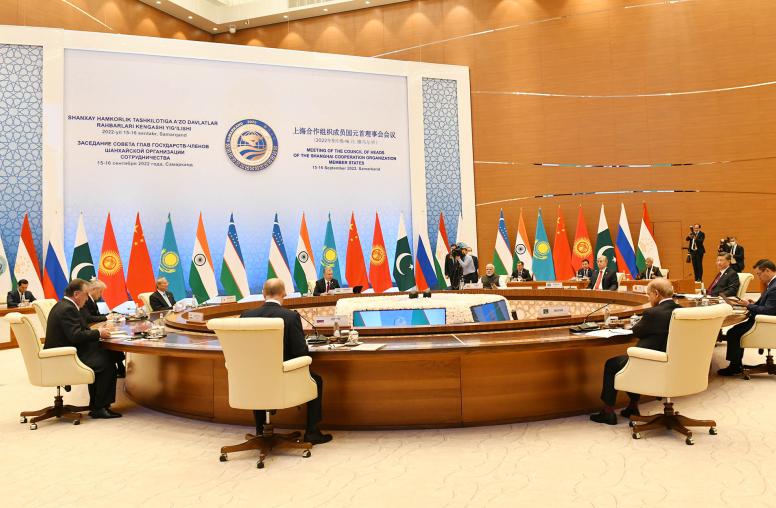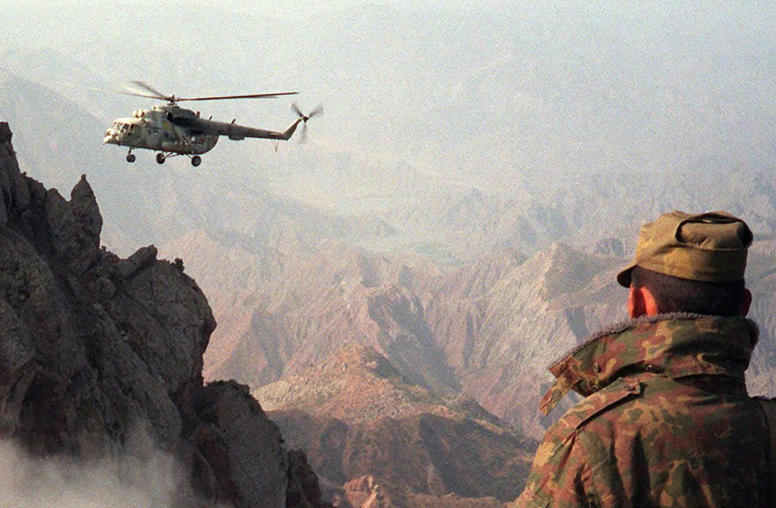Ukraine-Russia Conflict Colors View of Civic Roles in Central Asia
Ukraine and the countries of Central Asia wouldn’t seem to have much in common other than their former Soviet past. But post-Soviet Russian ambitions may be linking them in unexpected ways. The outcome of Ukraine’s current effort to consolidate its democracy, against Russia’s resistance, has ramifications for whether the Central Asian countries view civil society and democracy as a driver of instability or a force for reform.

More than two decades after the dissolution of the communist Soviet Union, citizens in the Central Asian countries of Kazakhstan, Kyrgyzstan, Tajikistan, Turkmenistan and Uzbekistan are expressing increasing skepticism towards democracy, said Scott Smith, USIP’s Director for Afghanistan and Central Asia, during a panel discussion at USIP on December 16th.
Maintaining stability was the primary concern of these countries, among both government and civil society organizations, said Smith, who recently returned from a trip to Tajikistan, Kazakhstan and Kyrgyzstan. The Central Asian republics did not expect to become independent before the Soviet Union dissolved, and some even voted against independence.
Their identities essentially have been in flux ever since. Democracy hasn’t become the norm, except to a certain extent in Kyrgyzstan, and the advent of limited religious freedoms that were unavailable under the USSR adds to the uncertainties.
“Transition has become a way of life,” said Kathleen Kuehnast, USIP’s director for gender and peacebuilding and a socio-cultural anthropologist with extensive experience in Kyrgyzstan. “The search for identity is paramount.”
It’s hard to even group the countries as a region because they differ so vastly, Kuehnast said. And a range of political and economic uncertainties leave Central Asia’s governments open to vulnerabilities.
According to Smith, the push for democracy where it has occurred has become increasingly associated with instability, and democratic institutions have been more and more often perceived as corrupt.
Perceptions of democracy
Ukraine’s “Euromaidan,” the popular uprising beginning in November 2013 that deposed President Viktor Yanukovych in favor of deeper ties with the European Union, deepened Central Asia’s perceptions of an association between democracy and instability. The role of the U.S. and the European Union in supporting the demonstrators at Euromaidan in Kyiv cemented, for some, the connection between Western-supported institutions and political instability.
The pro-democracy movement in Ukraine is thus seen by some in Central Asia through the lens of conspiracy theories as dominated by foreign interests, a view encouraged byMoscow, primarily the U.S. but also the European Union, said Dr. Erica Marat, Assistant Professor at National Defense University in Washington, DC.
“Kremlin propaganda,” which portrays Euromaidan and the subsequent political, social and military developments as a U.S. campaign to destabilize countries in order to justify its own presence in the region has amplified this perception, Marat said.
Along with a waning popular enthusiasm for democracy, governments also have increasingly closed what democratic space existed across the region. Responding to recently adopted Tajik legislation restricting demonstrations, Asia Plus news agency quoted Tajik political scientist Abdugani Mamadazimov as stating that the authorities have “opted for stability, to the detriment of democratic traditions.” This observation is not unique to Tajikistan. Legislation that tightly regulates civil society, modeled on a 2012 Russian law, is being considered across the region.
Closing space for civil society
Kyrgyzstan, for example, is debating a law requiring civil society groups receiving foreign financial support to register as “foreign agents” and comply with strict financial and activity reporting requirements. According to a Sept 18 open letter opposing the proposed law, posted by Article 19, an organization dedicated to uphold Article 19 of the UN Declaration of Human Rights relating to the freedom of speech and expression:
The Ministry of Justice may request documents relating to the operation of NGOs; send representatives to attend events organized by NGOs; and review the compliance of NGOs with their own statutes, including with respect to the use of funds.
Unscheduled inspections—or “harassment audits”— of organizations listed as “foreign agents” is also authorized. Kazakhstan has moved towards a similar tightening of laws with the passage of a new Criminal Code this past July.
In Tajikistan the government has also cracked down on public protests and increased its monitoring of social media and information platforms.
In one recent incident, an October 10 anti-government rally was scheduled by opposition movement Group 24 via a Facebook post. The government responded by shutting down dozens of websites like Facebook and YouTube, detaining family members of Group 24 leaders members, and deploying riot police against paid protestors to demonstrate capacity. The Interior Minister, Ramazon Rahimzoda, described the group during an interview for a Russian news agency as “criminals” who wanted to destabilize Tajikistan on the instructions of unspecified “foreign masters,” according to English coverage of the interview. Further, the Supreme Court rapidly ruled the group as “extremist,” legitimizing extraordinary measures against them.
Although analysts believe the group to have little standing among the Tajik populace, the strong response by the government reveals the depth of their concern over its own Facebook-fueled popular uprising.
Prospects for protests
Index rankings further reflect the closed space around freedom of expression and civic mobilization felt in Central Asia, post-Euromaidan. According to Reporters Without Border’s 2014 World Press Freedom Index, Kyrgyzstan leads the region with a ranking of 97, out of 180 countries. But the range is immense; Turkmenistan trailed at the bottom of the rankings as number 178, ahead of just North Korea and Eritrea.
Marat believes the possibility of protest against political and social conditions emblematic of Euromaidan exists, but that it is impossible to predict whether the region will move more to the center as a result. Smith, however, believes the deference to stability to be too great for a massive uprising to occur. Based on his discussions across the region, he believes there is a widely held fear, even among those in civil society, of pushing things too far and destabilizing the vulnerable system.
The role of geopolitics in the region as a driver of anti-democratic trends cannot be ignored.
The fear of political upheaval or even separatist movements on a scale of those seen in Ukraine is felt not only by the Central Asian countries but also as a secondary effect by China. Officials in Beijing need a stable Central Asia to protect their resource and other economic investments in the region but also to prevent the establishment of safe havens for China’s oppressed Uighur minority, said panel member Jacob Zenn, an analyst at the Jamestown Foundation.
Although it’s conceivable that China could partner with Central Asian governments to clamp down on separatists and secure its own population, an “unpredictable, opportunistic and on-the-move Russia” has the potential to foment separatism by deploying the same kind of hybrid warfare that it has used in Ukraine, warned Ambassador Bill Taylor, USIP’s acting president and a former ambassador to Ukraine. If Russia is permitted by the international community to annex Crimea, one can expect an even tighter control of public space by Russia’s southern neighbors.
So the fate of Ukraine in the Russia conflict matters in many ways to the prospects for civil society and any future that democracy might have in Central Asia. Experts agreed that if a positive result in Ukraine can emerge from the current chaos, Central Asian citizens – and reform-minded officials – might eventually be more willing to demand democratic norms and rights for their own countries.
Hanne Bursch is a program specialist for special initiatives at USIP.
Video
Russia, Afghanistan, Extremism: Factors Weighing on Central Asia
Scott Smith, USIP’s director of Afghanistan and Central Asia programs, says a recent visit to Tajikistan, Kazakhstan and Kyrgyzstan revealed a range of dynamics shaking the region.



